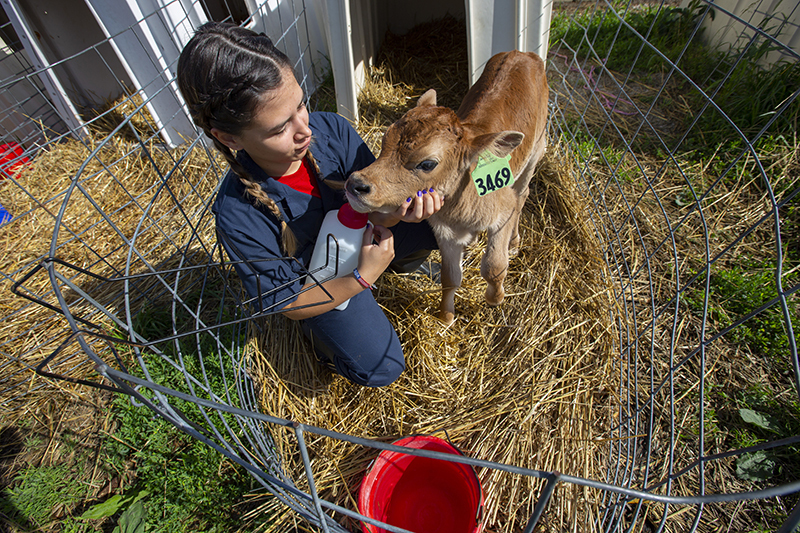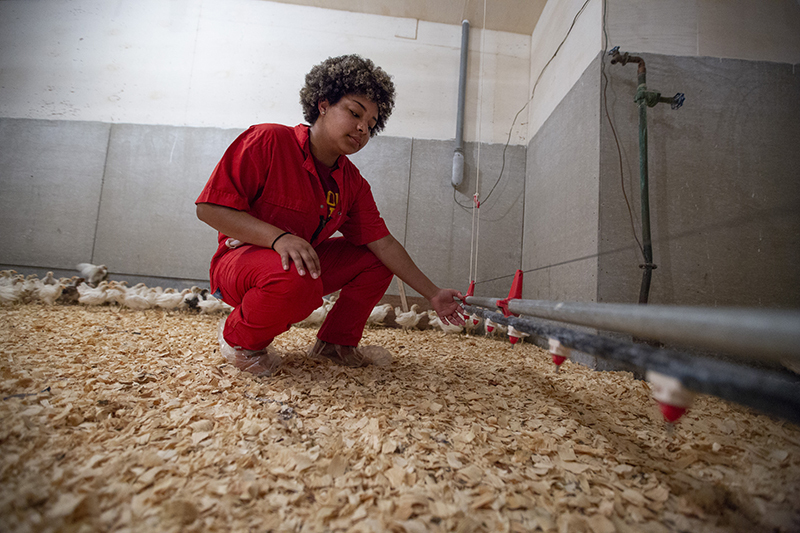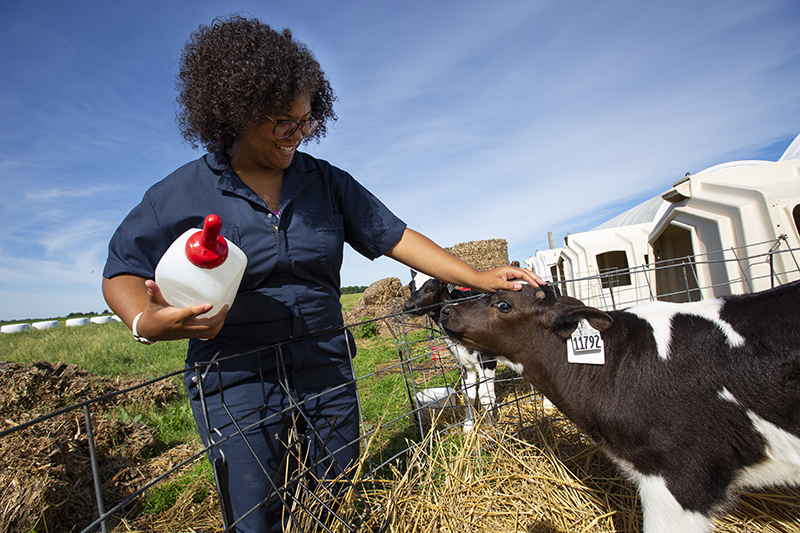For vet school hopefuls, new program provides essential experience
Author: Dave Roepke
This is an archived story. The content, links and information may have changed since the publication date.
Author: Dave Roepke

Ariana Sanchez, sophomore in animal ecology, checks on a dairy calf at the Dairy Science Farm. She is participating in the College of Veterinary Medicine's Food Animal Summer Experience, a program designed to help diversity the veterinary school's student populations. Photos by Christopher Gannon.
Ariana Sanchez would dress up like a veterinarian as far back as first grade. Claudia De Leon loved animals so much as a kid, her mother hid the litter boxes so they could have cats in their apartment. Seeing the insides of a fistulated cow at the Texas State Fair about a decade ago hooked J'Haira Rhodes on large animals.
But beyond being Iowa State undergraduates who have long dreamed of going to veterinary medicine school, Sanchez, De Leon and Rhodes also share a lack of extensive hands-on experience with a wide variety of animals. They're changing that this summer. A new program by the College of Veterinary Medicine is providing them and five other students of color an opportunity to care for food animals and job shadow veterinarians, a background that's needed for vet school admission but often difficult to acquire.
"It's what we've been looking for," Sanchez said as she nursed baby calves at the Dairy Science Farm. "This program will change our lives, I think."
The 10-week Food Animal Summer Experience program covers the room and board of eight Iowa State students who have interest in applying to the College of Veterinary Medicine but limited experience with animals. They spend their mornings working alongside staff on the animal science department's teaching and research farms, rotating among dairy, poultry, swine, beef and sheep. In the afternoons, they're at the college's hospitals and clinics observing all aspects of veterinary care.
"The other day we got to castrate pigs," De Leon said. "That was fun."
Most vet schools require for admission some level of experience with animals or veterinary work. At Iowa State, it's 200 hours. The program, which runs May 29-Aug. 3, is designed to satisfy the 200-hour requirement and help students understand the day-to-day duties of veterinarians.
"Both learning what you want to do as well as what you don't want to do is important," said Dr. Alex Ramirez, associate professor of veterinary diagnostic and production animal medicine and the interim assistant dean of academic and student affairs.
Veterinary medicine is "one of the whitest professions," Ramirez said, and the college in recent years has become more aggressive in seeking to diversify its student body. It hired a recruiter and temporarily suspended the in-person interviews once required for a successful application, a move that remains under consideration moving forward, he said.
Those efforts have yielded a sharp increase in overall applications, Ramirez said. Last year's entering class included 11 students who identified as underrepresented. This fall's class includes 22 underrepresented students, he said. He is hopeful the Food Animal Summer Experience will help maintain a pipeline of diverse applicants.
"The more backgrounds and diversity you bring into any profession, the more open-ended you are, the more you think outside of the box and improve outcomes," Ramirez said.
The college funded the program's inaugural year but is seeking sponsors to sustain it, he said.
The eight women in the program, none of them from Iowa, were among nearly two dozen applicants, said Dr. Jessie Juarez, a veterinarian and lecturer in animal science who is coordinating the Food Animal Summer Experience. Students applying were asked to rate their interest in being a veterinarian on a scale of 1 to 10.
"They were all 10 out of 10," Juarez said of the students selected.
The group has been highly engaged, asking tons on questions, she said. Their excitement for working with different species for the first time is obvious.
"I guess I'd forgotten that initial feeling, so it's kind of fun to relive that with them," Juarez said.
Rhodes said she's appreciated learning the different practices at each farm and watching surgery at the hospital. She's also been impressed by how involved Veterinary Medicine students are in animal care. The program has been an awesome opportunity, she said.
The number of students involved in future summers probably couldn't increase dramatically without overwhelming the staff at the teaching farms, who have been enthusiastic partners, Juarez said. A smaller group also allows students to connect with each other. That's been one of the highlights for Sanchez, who noted they may end up in vet school together someday soon.
"We're going to see each other in the future," she said. "It just makes me more excited for what's to come."

J’Haira Rhodes, junior in animal science, inspects a water supply for young white leghorns at the Poultry Science Farm. She is participating in the College of Veterinary Medicine's Food Animal Summer Experience. She's one of eight ISU students of color in the College of Veterinary Medicine's new Food Animal Summer Experience program.

Claudia Deleon, sophomore in animal science, greets a dairy calf at the Dairy Science Farm. She's one of eight students of color from Iowa State in the inaugural Food Animal Summer Experience, a College of Veterinary Medicine program that aims to help develop a pipeline of diverse vet school applicants.